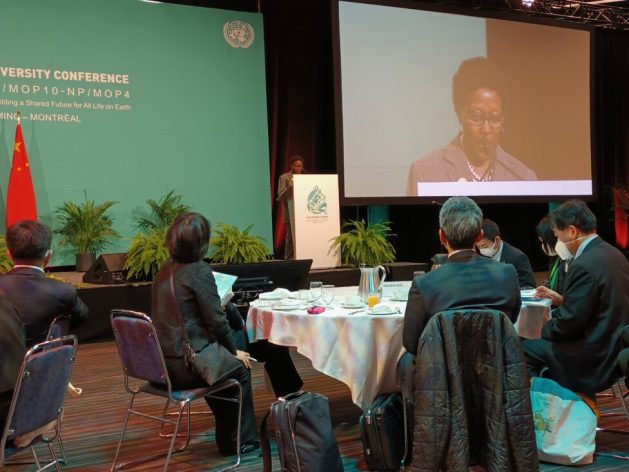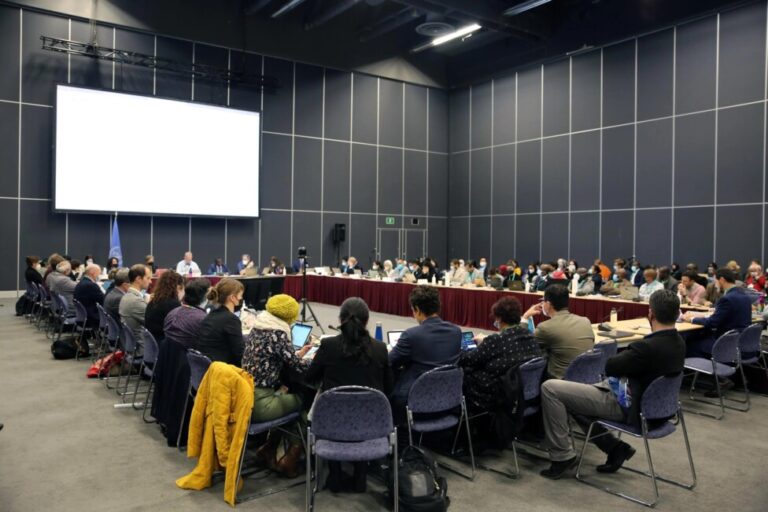Digital Treatment of Genetic Resources Shakes Up COP15

MONTREAL, Dec 16 (IPS) - In addition to its nutritional properties, quinoa, an ancestral grain from the Andes, also has cosmetic uses, as stated by the resource use and benefit-sharing permit ABSCH-IRCC-PE-261033-1 awarded in February to a private individual under a 15-month commercial use contract.
The permit, issued by the Peruvian government's National Institute for Agrarian Innovation, allows the Peruvian beneficiary to use the material in a skin regeneration cream.
But it also sets restrictions on the registration of products obtained from quinoa or the removal of its elements from the Andean nation, to prevent the risk of irregular exploitation without a fair distribution of benefits, in other words, biopiracy.
The licensed material may have a digital representation of its genetic structure which in turn may generate new structures from which formulas or products may emerge. This is called digital sequence information (DSI), in the universe of research or commercial applications within the CBD.
Treatment of DSI forms part of the debates at the 15th Conference of the Parties (COP15) to the United Nations Convention on Biological Diversity (CBD), which began on Dec. 7 and is due to end on Dec. 19 at the Palais des Congrès in the Canadian city of Montreal.
The summit has brought together some 15,000 people representing the 196 States Parties to the CBD, non-governmental organizations, academia, international bodies and companies.
The focus of the debate is the Post-2020 Global Framework on Biodiversity, which consists of 22 targets in areas including financing for conservation, guidelines on digital sequencing of genetic material, degraded ecosystems, protected areas, endangered species, the role of business and gender equality.
Like most of the issues, negotiations on DSI and the sharing of resulting benefits, contained in one of the Global Framework's four objectives and in target 13, are at a deadlock, on everything from definitions to possible sharing mechanisms.
Except for the digital twist, the issue is at the heart of the Nagoya Protocol on Access to Genetic Resources and the Fair and Equitable Sharing of Benefits Arising from their Utilization, part of the CBD, signed in that Japanese city in 2010 and in force since 2014.

Amber Scholz, a German member of the DSI Scientific Network, a group of 70 experts from 25 countries, said there is an urgent need to close the gap between the existing innovation potential and a fair benefit-sharing system so that digital sequencing benefits everyone.
"It's been a decade now and things haven't turned out so well. The promise of a system of innovation, open access and benefit sharing is broken," Scholz, a researcher at the Department of Microbial Ecology and Diversity in the Leibniz Institute’s DSMZ German Collection of Microorganisms and Cell Cultures, told IPS.
DSI stems from the revolution in the massive use of technological tools, which has reached biology as well, fundamental in the discovery and manufacture of molecules and drugs such as those used in vaccines against the coronavirus that caused the COVID-19 pandemic.
The Aichi Biodiversity Targets, adopted in 2010 in that Japanese city during the CBD COP10, were missed by the target year, 2020, and will now be renewed and updated by the Global Framework that will emerge from Montreal.
The targets included respect for the traditional knowledge, innovations and practices of indigenous and local communities related to the conservation and sustainable use of biological diversity, their customary use of biological resources, and the full and effective participation of indigenous and local communities in the implementation of the CBD.
Lack of clarity in the definition of DSI, challenges in the traceability of the country of origin of the sequence via digital databases, fear of loss of open access to data and different outlooks on benefit-sharing mechanisms are other aspects complicating the debate among government delegates.
Through the Action Agenda: Make a Pledge platform, organizations, companies and individuals have already made 586 voluntary commitments at COP15, whose theme is "Ecological civilization: Building a shared future for all life on earth".
Of these, 44 deal with access and benefit sharing, while 294 address conservation and restoration of terrestrial ecosystems, 185 involve partnerships and alliances, and 155 focus on adaptation to climate change and emission reductions.
Genetic havens
Access to genetic resources for commercial or non-commercial purposes has become an issue of great concern in the countries of the global South, due to the fear of biopiracy, especially with the advent of digital sequencing, given that physical access to genetic materials is not absolutely necessary.
Although the Nagoya Protocol includes access and benefit-sharing mechanisms, digital sequencing mechanisms have generated confusion. In fact, this instrument has created a market in which lax jurisdictions have taken advantage by becoming genetic havens.
Around 2,000 gene banks operate worldwide, attracting some 15 million users. Almost two billion sequences have been registered, according to statistics from GenBank, one of the main databases in the sector and part of the U.S. National Center for Biotechnology Information.
Argentina leads the list of permits for access to genetic resources in Latin America under the Protocol, with a total of 56, two of which are commercial, followed by Peru (54, four commercial) and Panama (39, one commercial). Mexico curbed access to such permits in 2019, following a scandal triggered by the registration of maize in 2016.
There are more than 100 gene banks operating in Mexico, 88 in Peru, 56 in Brazil, 47 in Argentina and 25 in Colombia.
The largest providers of genetic resources leading to publicly available DSI are the United States, China and Japan. Brazil ranks 10th among sources and users of samples, according to a study published in 2021 by Scholz and five other researchers.
The mechanisms for managing genetic information sequences have become a condition for negotiating the new post-2020 Global Framework for biodiversity, which poses a conflict between the most biodiverse countries (generally middle- and low-income) and the nations of the industrialized North.
Indigenous people and their share
Cristiane Juliao, an indigenous woman of the Pankararu people, who is a member of the Brazilian Coordinator of Indigenous Peoples and Organizations of the Northeast, Minas Gerais and Espírito Santo, said the mechanisms adopted must favor the participation of native peoples and guarantee a fair distribution of benefits.
“We don't look at one small element of a plant. We look at the whole context and the role of that plant. All traditional knowledge is associated with genetic heritage, because we use it in food, medicine or spiritual activities," she told IPS at COP15.
Therefore, she said, "traceability is important, to know where the knowledge was acquired or accessed.”
In Montreal, Brazilian native organizations are seeking recognition that the digital sequencing contains information that indigenous peoples and local communities protect and that digital information must be subject to benefit-sharing. They are also demanding guarantees of free consultation and the effective participation of indigenous groups in the digital information records.
Thanks to the system based on the country’s Biodiversity Law, in effect since 2016, the Brazilian government has recorded revenues of five million dollars for permits issued.
The Working Group responsible for drafting the new Global Framework put forward a set of options for benefit-sharing measures.
They range from leaving in place the current status quo, to the integration of digital sequence information on genetic resources into national access and benefit-sharing measures, or the creation of a one percent tax on retail sales of genetic resources.
Lagging behind
There is a legal vacuum regarding this issue, because the CBD, the World Intellectual Property Organization and the International Treaty on Plant Genetic Resources for Food and Agriculture, in force since 2004, do not cover all of its aspects.
Scholz suggested the COP reach a decision that demonstrates the political will to establish a fair and equitable system. "The scientific community is willing to share benefits through simple mechanisms that do not unfairly burden researchers in low- and middle-income countries," she said.
For her part, Juliao demanded a more inclusive and fairer system. "There is no clear record of indigenous peoples who have agreed to benefit sharing. It is said that some knowledge comes from native peoples, but there is no mechanism for the sharing of benefits with us.”
IPS produced this article with support from Internews'Earth Journalism Network.
© Inter Press Service (2022) — All Rights Reserved. Original source: Inter Press Service
Where next?
Browse related news topics:
- Trade, Economy, & Related Issues
- Causes of Poverty
- United Nations on Development Issues
- Non-governmental Organizations on Development Issues
- Free Trade and Globalization
- Geopolitics
- Human Rights Issues
- Environmental Issues
- Biodiversity
- Nature and Animal Conservation
- Climate Change and Global Warming
- Consumption and Consumerism
- Sustainable Development
- Rights of Indigenous People
- Democracy
- Global Financial Crisis
Read the latest news stories:
- African Diaspora Exhibition Showcases Transformative Solidarity and the Legacy of Slavery Wednesday, March 26, 2025
- A Chance for Sisi to Follow Sadat's Vision and Courage Wednesday, March 26, 2025
- Will UN be a Possible Target as US Goes on a Rampage? Wednesday, March 26, 2025
- Malnutrition Not Due to Cash Poverty Alone Wednesday, March 26, 2025
- Can renewable energy survive climate change? Wednesday, March 26, 2025
- Empowering Women in Agriculture: Breaking Barriers for a Thriving Future Tuesday, March 25, 2025
- Royalties, a New Indigenous Right for Hydroelectric Damages in Brazil Tuesday, March 25, 2025
- Young Women in Afghanistan Driven to Suicide Amid Widespread Frustration Tuesday, March 25, 2025
- Strengthening Indigenous Peoples and Local Communities’ Knowledge and Access Opens up Opportunities for Climate, Biodiversity and Desertification Action Tuesday, March 25, 2025
- The Ocean Creeps In: Tanzanian Coastal Communities Fight a Losing Battle Tuesday, March 25, 2025
Learn more about the related issues:
- Trade, Economy, & Related Issues
- Causes of Poverty
- United Nations on Development Issues
- Non-governmental Organizations on Development Issues
- Free Trade and Globalization
- Geopolitics
- Human Rights Issues
- Environmental Issues
- Biodiversity
- Nature and Animal Conservation
- Climate Change and Global Warming
- Consumption and Consumerism
- Sustainable Development
- Rights of Indigenous People
- Democracy
- Global Financial Crisis